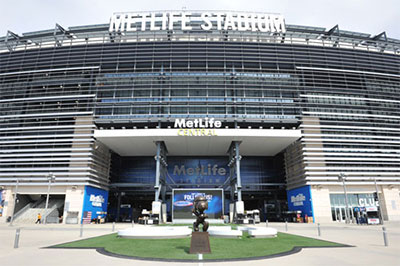Arecont Vision Megapixel Cameras Deliver Superior Video Surveillance at MetLife Stadium
Arecont Vision, a manufacturer of IP-based megapixel camera technology, has been selected by  MetLife Stadium’s security management team to provide comprehensive, undisrupted video coverage throughout every part of its venue. Arecont Vision megapixel cameras have been deployed to ensure wide area coverage with extreme detail and the ability to electronically zoom into live and recorded footage without affecting wide area surveillance. The best-in-breed video surveillance solution was built around Arecont Vision’s megapixel imaging technology to ensure that the highest levels of security and surveillance are maintained at the facility without impeding the fan experience.
MetLife Stadium’s security management team to provide comprehensive, undisrupted video coverage throughout every part of its venue. Arecont Vision megapixel cameras have been deployed to ensure wide area coverage with extreme detail and the ability to electronically zoom into live and recorded footage without affecting wide area surveillance. The best-in-breed video surveillance solution was built around Arecont Vision’s megapixel imaging technology to ensure that the highest levels of security and surveillance are maintained at the facility without impeding the fan experience.
“We are pleased that our innovative megapixel imaging solutions are playing a key role in the deployment of this advanced video surveillance solution,” said Scott Schafer, executive vice President, Arecont Vision. “The Arecont Vision megapixel cameras installed at MetLife Stadium provide coverage of the stadium bowl, gates and plaza areas, with excellent cost-efficiency by using far fewer cameras versus legacy IP VGA or analog cameras. Because the number of cameras is reduced, the system can be more effectively managed. The key attributes to a solution like this are excellent image quality to identify activity and people, frame rates to see the action, Day/Night video capabilities, reduced network and storage expense via H.264 compression and Power over Ethernet (PoE) to reduce power cabling costs.”
The new video surveillance system installed at MetLife Stadium was designed by Corporate Security Services, Inc. located in Edison, New Jersey. The Arecont Vision megapixel cameras are managed using Genetec Security Center, a unified video management system (VMS), which is controlled from a centralized security command center in MetLife Stadium.
The Arecont Vision megapixel cameras that have been deployed at MetLife Stadium including MegaVideo compact 10-megapixel (MP) cameras located inside the bowl to monitor exterior seating areas, SurroundVideo panoramic 8MP cameras to provide 180° degree coverage of all entrances and MegaDome 2 3MP cameras with remote focus, remote zoom and wide dynamic range (WDR) located in the stadium’s security entrance areas.
Arecont Vision MegaVideo Compact Series box cameras are available in 1.3MP to 10MP resolutions with features that include dual H.264/MJPEG encoding, fast frame rates, privacy masking, pixel binning to increase light sensitivity in 3MP, 5MP and 10MP models, extended motion detection grid, flexible cropping and PoE. MegaVideo Compact Series cameras are available in color and Day/Night configurations.
SurroundVideo Series megapixel cameras from Arecont Vision are all-in-one 180° and 360° panoramic solutions that are available in 8MP, 12MP WDR, 20MP and 40MP resolutions. Housed in environmental rated IP66 domes, the units feature dual H.264/MJPEG encoding, true day/night functionality with IR cut filter and IR corrected megapixel lenses, privacy masking, extended motion detection, bit rate control, binning mode to increase light sensitivity in 12MP, 20MP and 40MP models, fast image rates and WDR in 12MP models.
Arecont Vision MegaDome 2 all-in-one cameras with remote focus and remote zoom are available in 1080p, 3MP, 5MP and 10MP resolutions. Features include an IP66 dome chassis with a 3-axis camera gimbal, dual H.264/MJPEG encoding, integrated megapixel vari-focal lens, optional WDR in 1080p and 3MP models, pixel binning in 3MP, 5MP and 10MP models, total PoE and optional IR illumination, audio functionality and heater kit.
Photo credit: William Hauser/MetLife Stadium